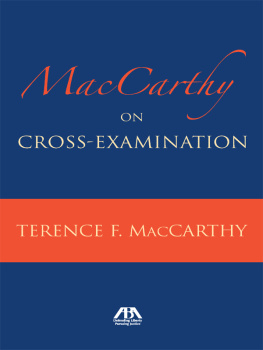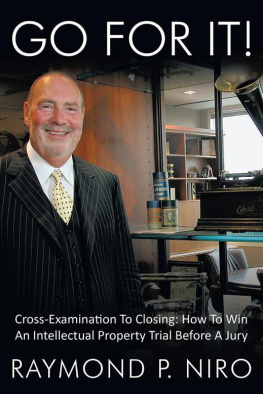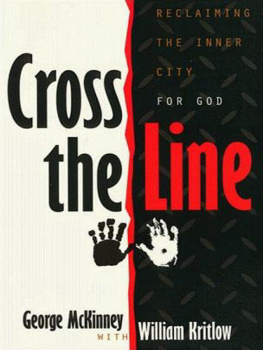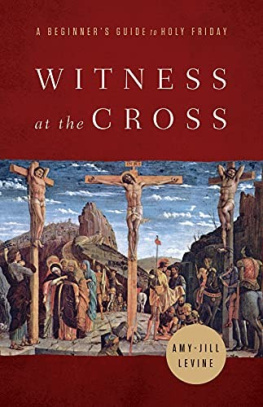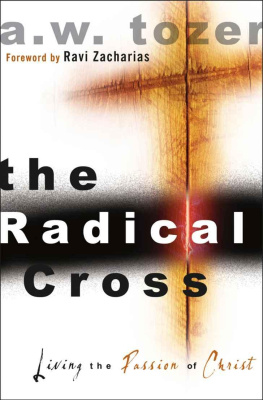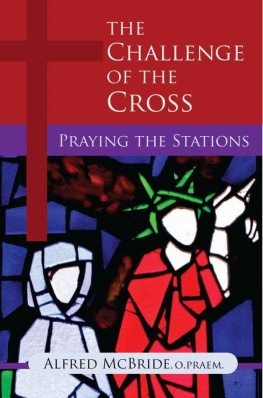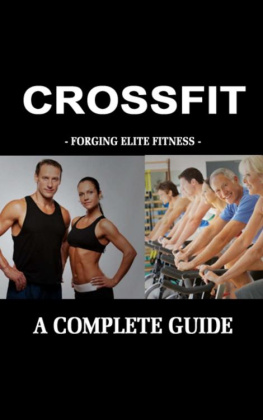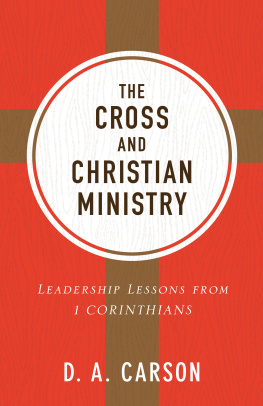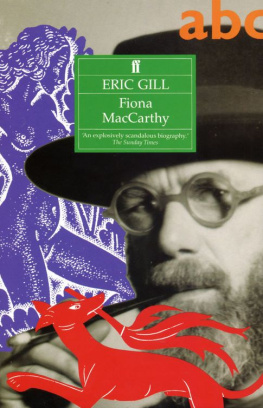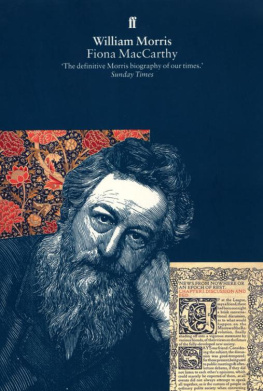MacCarthy ON CROSS-EXAMINATION
TERENCE F. M AC CARTHY

Cover design by ABA Publishing
The materials contained herein represent the opinions and views of the authors and/or the editors, and should not be construed to be the views or opinions of the law firms or companies with whom such persons are in partnership with, associated with, or employed by, nor of the American Bar Association unless adopted pursuant to the bylaws of the Association.
Nothing contained in this book is to be considered as the rendering of legal advice for specific cases, and readers are responsible for obtaining such advice from their own legal counsel. This book and any forms and agreements herein are intended for educational and informational purposes only.
Excerpt from Presumed Innocent by Scott Turow (Farrar, Straus & Giroux, 1987) used by permission of the author.
2007 American Bar Association. All rights reserved. No part of this publication may be reproduced, stored in a retrieval system, or transmitted in any form or by any means, electronic, mechanical, photocopying, recording, or otherwise, without the prior written permission of the publisher. For permission contact the ABA Copyrights & Contracts Department, or via fax at (312) 988-6030.
Library of Congress Cataloging-in-Publication Data
MacCarthy, Terence.
Maccarthy on cross-examination / Terence F. MacCarthy.
p. cm.
1. Cross-examinationUnited States. I. Title.
KF8920.M33 2007
347.7375dc22
ISBN: 978-1-61438-338-3
Discounts are available for books ordered in bulk. Special consideration is givento state bars, CLE programs, and other bar-related organizations. Inquire at BookPublishing, ABA Publishing, American Bar Association, 321 North Clark Street,Chicago, Illinois 60610.
www.ababooks.org
Epigraph
The age-old tool for ferreting out truth in the trial process is the right to cross-examination. For two centuries past, the policy of the Anglo-American system of evidence has been to regard the necessity of testing by cross-examination as a vital feature of the law.
Perry v. Leake , 488 U.S. 272, 283 n.7 (1989)
[T] he principal purpose of cross-examination [is] to challenge whether the declarant was sincerely telling what he believed to be the truth, whether the declarant accurately perceived and remembered the matter he related, and whether the declarants intended meaning is adequately conveyed by the language he employed.
Ohio v. Roberts , 448 U.S. 56, 71 (1980)
Cross-examination often depends for its effectiveness on the ability of course to punch holes in a witness, testimony at just the right time, in just the right way.
Perry v. Leake, 488 U.S. 272, 282 (1989)
The Sixth Amendment right of an accused to confront the witnesses against him is a fundamental right.
Pointer v. State of Texas , 380 U.S. 400, 403 (1965).
[A] denial of cross-examination without waiver would be constitutional error of the first magnitude and no amount of showing of want of prejudice would cure it.
Brookhart v. Janis , 384 U.S. 1, 3 (1966)
In Alford v. United States, 282 U.S. 687, 692 (1931), in reversing a federal conviction because of restrictions on cross-examination, a unanimous Court stated:
It is the essence of a fair trial that reasonable latitude be given the cross-examiner, even though he is unable to state to the court what facts a reasonable cross-examination might develop. Prejudice ensues from a denial of the opportunity to place the witness in his proper setting and put the weight of his testimony and his credibility to a test, without which the jury cannot fairly appraise them . To say that prejudice can be established only by showing that the cross-examination, if pursued, would necessarily have brought out facts tending to discredit the testimony in chief, is to deny a substantial right and withdraw one of the safeguards essential to a fair trial.
And in Smith v. Illinois , 390 U.S. 129, 132-33 (1968), the Court reversed a state conviction where the trial judge restricted the right of cross-examination.
Cross-examination is the greatest legal engine ever invented for the discovery of truth.
5 J. Wigmore, Evidence 1367 (J. Chadbourn, rev. 1974)
Cross-examination is the principle means by which the believability of a witness and the truth of his or her testimony are tested.
Davis v. Alaska , 415 U.S. 308, 316 (1974).
Contents
Terence F. MacCarthy (Chicago, Illinois)
Cross-examination of a psychiatrist in a federal
bank robbery
Michael A. Sherman (Santa Monica, California)
Cross-examination of a plaintiffs CEO in a civil
trade secrets case
Alison Siegler (Chicago, Illinois)Cross-examination
of a prosecution witness in a federal narcotics case
Steven R. Shanin (Chicago, Illinois)Cross-examination
of a police detective in a federal narcotics case
James Mercante (New York, New York)Cross
examination of a captain in an admiralty case
Heather E. Williams (Tucson, Arizona)Cross
examination of a county sheriff officer in a federal
murder case
John Buckley, Ungaretti & Harris, Chicago, Illinois
Cross-examination of a securities trading firm
Acknowledgments
This book is dedicated to, in proper order, three groups of people.
First and obviously, my wonderful wife, Marian, who, because of her many years with me, is assured a place in heaven. Our children, who fortunately usually act like their mother: our eldest, Dan; Sean and his lovely wife, Micha; my namesake, Terry, and his wonderful wife, Aicha Marie; and our daughter, Megan, and her great husband, Tim OSullivan. Also our delightful and entertaining grandchildren, Kylee, Leah, Donal, Jude, and the twins, Deirdre and Dori. They keep me going.
Next, I thank all of the dedicated lawyers and supporting staff with whom I have had the privilege of working at our Federal Defender office. Also my fellow Federal Defenders and their committed lawyers and support staff, who are responsible for the finest defender services the world has ever known.
The third group (note my love for having three things) is as large as it is important.
Trial lawyers are indeed a special group. They profit much from the opportunity to work together and exchange ideas. They profit much from the comrades they enjoy. They profit much from their mutual love for what they do.
I have been blessed by the opportunity to work with and learn from many trial lawyers and judges. In appreciation, I dedicate this book to them.
Alaska: | Ray Brown |
Arizona: | Russ Born, Bob Hirsch, Robert McWhirter, Jon Sands, Heather Williams |
Arkansas: | William O. James, Jr. |
California: | Marilyn Bednarski, Juanita Brooks, James J. Brosnahan, Judy Clarke, John Cleary, Brian Donato, David A. Elden, Jeff Hansen, Eugene Iredale, Rikki Klieman, Michael Pancer, Jon Minsloff, Marcia Morrissey, Phillip Pennypacker, Grover Porter, Judge Manuel Real, Dennis Roberts, Bart Sheela, Michael Stepanian, Barry Tarlow, Vicki Young, Howard L. Weitzman |
Colorado: | Justice Michael Bender, Judge Russ Carparelli, Linda Miller, Steve Rench, Richard Tegtmeier, Craig Truman |
District of Columbia: | Jud Best, Ken Curtis, Hays Gorey, Jr., Tom Horton, A. J. Kramer, John Lowe, Bill Moffitt, Steve Saltzburg, Mike Tigar |
Florida: | Skipp Babb, Joe Beeler, Roy Black, Barry Cohen, Jim Gailey, Fred Haddad, Carey Haughwout, Richard Hersch, Milton Hirsch, Albert Krieger, Bruce Lyons, Tony Natale, Hugo Rodriguez, Judge E. J. Salcines, Teresa Sopp, Jeffrey Weiner, Fred Zinobar |

